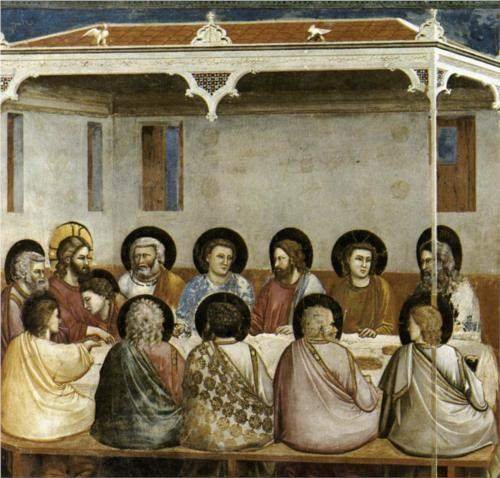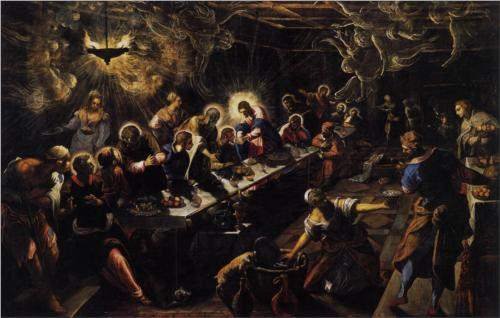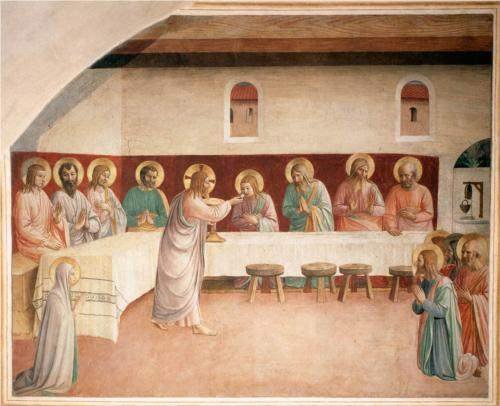
[The fruit of another discussion somewhere.]
The Real Presence of Christ does not appear in Scripture? You must be stretching really hard not to see it. 😉 As I said above, Jesus makes painfully clear his literal intentions in John 6:
“I am the bread of life; he who comes to me shall not hunger, and he who believes in me shall never thirst.” (John 6:35)
“I am the bread of life. … This is the bread which comes down from heaven, that a man may eat of it and not die.” (John 6:48–50)
“I am the living bread which came down from heaven; if any one eats of this bread, he will live for ever; and the bread which I shall give for the life of the world is my flesh.” (John 6:51)
When the Jews hear this, naturally, they are alarmed and confused — is this man suggesting we become cannibals? “How can this man give us his flesh to eat?” (John 6:52). Obviously, they are misunderstanding Him, right? Surely He didn’t mean for them to take this literally, right? So you would think He would correct them.
But He doesn’t. He does just the opposite.
The Jews then disputed among themselves, saying, “How can this man give us his flesh to eat?” Consequently [Greek οὖν, so, therefore, consequently, accordingly] Jesus said to them, “Truly, truly, I say to you, unless you eat the flesh of the Son of man and drink his blood, you have no life in you.” (John 6:52–53)

A lot rests on that οὖν: It connects Jesus’s repeated admonition that the people must eat His flesh and drink His blood as a direct response and consequence of the crowd’s supposed “misunderstanding”: Rather than saying, “No, you’ve got it wrong; I’m only being ‘spiritual,'” he tells them, “Yes, I’m bloody serious.”
“He who eats my flesh and drinks my blood has eternal life, and I will raise him up at the last day.” (John 6:54)
“For my flesh is true food, and my blood is true drink.” (John 6:55) (The word here translated “true,” ἀληθής, can alternately be translated real, genuine, actual, not imaginary.)
“He who eats my flesh and drinks my blood abides in me, and I in him.” (John 6:56) (He even uses a different, much more visceral, if not vulgar, word for “eat” here: τρώγω, the word for animals feeding or munching.)
“As the living Father sent me, and I live because of the Father, so he who eats me will live because of me. This is the bread which came down from heaven, not such as the fathers ate and died; he who eats this bread will live for ever.” (John 6:57)

Jesus says, not once, not twice, but some dozen times altogether, not only that “He is the bread of life,” but that “this bread is actually My flesh” and “this drink is actually My blood” and “you must eat Me and drink Me” to have eternal life. He uses explicit words that cannot be mistaken for “spiritual” terms, even using several different words in the discourse to make Himself clear. When the crowd questions, in disgust, whether He is serious, He makes no effort to correct them, but instead affirms using even stronger language that what He is saying is the literal truth. And in the end, as a direct result of this discourse, “many of his disciples drew back and no longer went about with him” (John 6:66), muttering that “this is a hard saying” (John 6:60), because they did take His words literally. And yet Jesus made no attempt to clarify Himself if they were mistaken, but instead reaffirmed again and again his literal meaning. He could not have been more explicit if He tried — for in fact He did try.
And then, as if this weren’t enough — but he then gives His Apostles the actual occasion to eat His flesh and drink His blood:
Now as they were eating, Jesus took bread, and blessed, and broke it, and gave it to the disciples and said, “Take, eat; this is my body.” (Matthew 26:26)
And as they were eating, he took bread, and blessed, and broke it, and gave it to them, and said, “Take; this is my body.” (Mark 14:22)
And he took bread, and when he had given thanks he broke it and gave it to them, saying, “This is my body which is given for you. Do this in remembrance of me.” (Luke 22:19)
And when he had given thanks, he broke it, and said, “This is my body which is for you. Do this in remembrance of me.” (1 Corinthians 11:24)
If any one of these four authors had meant to imply that this giving of His Body and Blood were meant to be mere symbols, one would think they would have used less explicit and more figurative language.
Not a Gate, or a Vine, or a Light?
Regarding your rejoinder that Jesus also said He “is the Door,” “the Vine,” the “Way,” etc. [and that these cases are not to be taken literally, so why should we take John 6 literally?] — yes, this is the common Protestant response. But allow me to point out a couple of things:
1. When Jesus expresses these metaphors, they are directly related to the verbs he applies to them, which are to be taken literally:
“I am the door; if any one enters by me, he will be saved, and will go in and out and find pasture.” (John 10:9)
Jesus said to her, “I am the resurrection and the life; he who believes in me, though he die, yet shall he live.” (John 11:25)
Jesus said to him, “I am the way, and the truth, and the life; no one comes to the Father, but by me.” (John 14:6)
“I am the vine, you are the branches. He who abides in me, and I in him, he it is that bears much fruit, for apart from me you can do nothing.” (John 15:5)
We are literally supposed to follow Jesus, enter into eternal life by Him, believe in Him, come to the Father by Him, and abide in Him. This rhetorical device applies in every case in which Jesus says I AM something.
2. But in John 6, Jesus says, using several different verbs:
“I am the living bread which came down from heaven; if any one eats of this bread, he will live for ever; and the bread which I shall give for the life of the world is my flesh.” (John 6:51)
“He who eats my flesh and drinks my blood has eternal life, and I will raise him up at the last day.” (John 6:54)
“He who eats my flesh and drinks my blood abides in me, and I in him.” (John 6:56)
Et cetera. So, for these times, following the other times Jesus said I AM something, are we not also supposed to literally eat and drink Him? In all these cases, though Jesus is speaking metaphorically, He is also speaking quite literally — and this case is no different.
What is more, your position supposes that every Christian from the Apostles to the sixteenth century — who certainly read Jesus’s discourse literally and believed Jesus was really and substantially present in the Eucharist — was mistaken in their interpretation and “silly.” Even John Calvin believed fully that Jesus was really present in the elements in a spiritual sense, and read John 6 literally.

Excellent! I really enjoyed this post, Joseph. Thank you!
Thank you so much. 🙂
The irony of this (as someone who’s tradition fully and unashamedly proclaims the real presence) is that we figured out pretty quickly we could not in the most literal sense eat the flesh of Jesus’ body and drink his blood, so we used trans/consubstantiation to figure out how.
Except I don’t think the Early Church thought so deeply on it as we later did. When Jesus said this is My Body, they believed Him.
Which is why Lutherans generally reject the “consubstantiation” label, while holding to the basic principle, because that label is the result of fine tuning of a Greek metaphysical concept. We’ll see he’s there, but we don’t need to explain how.
Which is also why I’m frustrated when Protestant opponents focus on “transubstantiation” as a point of opposition, arguing that it’s a medieval invention. Yes, “transubstantiation,” and the Aristotelean metaphysics that underpin it, are a medieval definition; but we hold it only because it is the best explanation anyone has presented of what the Church has always believed: that the consecrated Elements of the Eucharist actually become the Body and Blood of Christ.
Protestants get frustrated, too, because those of us (not all of us) who agree that Jesus is truly and really present are rejected because we won’t subscribe to a specific, human-created understanding of how that works.
I do think the metaphysics may have been overemphasized in the past, perhaps; but I know deviations from the traditional Catholic view can have some serious implications. For example, holding that Jesus is only sacramentally present in the Eucharist during the liturgy itself can result in a lack of reverence for the unconsumed Hosts after the liturgy is over — like giving them to the kids to snack on, as an ELCA friend of mine reported.
I grew up in an ELCA church and I can tell you for sure that we were never allowed to snack on the Hosts! That sounds like a bad judgment call by your friend’s church leaders.
I think typically, unused Hosts are put back and used the following Sunday. But you do bring up a good point because there is no solid rule on how they should be handled.
It makes a difference whether hosts are being used or bread is being used. I despise the use of hosts, but they are convenient to seal away and use again.
With bread, the question “What do we do with it now?” is more complicated, because bread goes bad, and nobody wants moldy Jesus. We’ve had this fight at my seminary, with strong opinions on the different options:
1) Consume it. Any leftover eucharist bread, wine, and grape juice should be consumed so that none of it is wasted. This is why churches will give out the bread after the service, even to children (who take communion during the service anyway), that it may be consumed. I’ve known churches where the pastor was expected to finish off the chalices of wine and grape juice during the communion liturgy, with the bread shrared later. For some in the seminary community, this was the preferred practice.
2) Return it to the earth. This was my preferred practice when I was the seminary’s sacristan, as overconsumption of leftover wine in the past led to some serious problems. Many churches have piscinas, which drain directly into the earth and not the sewer system, for the respectful return of the elements to the earth. Since the seminary had no piscina, we would carefully and respectfully pour the wine and grapejuice into the garden, brush off the bread crumbs into the garden, and rinse the vessels with water in the garden.
3) Store it. This is difficult, as I mentioned, with real bread. The wine keeps well, but the bread and grape juice don’t unless you refridgerate or freeze it. This is an easy enough practice for hosts, but as I said, I hate using hosts.
Out of curiosity, why don’t you like the host-wafers? They are much easier to manage — for one thing, you don’t have to bake bread; for another, you can estimate how many communicants there will be, keep a reasonable number on hand, and use the reserved, consecrated ones at the next Mass. Also, it is more in keeping with the Jewish tradition of unleavened bread than regular bread.
My parish in Mississippi had a piscina. We don’t have one in my small one now, so we are careful with how we manage the elements.
It all seems complicated and a little schizophrenic — why the reverence of storing it or disposing of it reverently if the Elements are not Jesus after the liturgy?
I have never understood the Lutheran position. On what basis does anybody suppose the Elements revert to bread and wine? “Take; eat; this will be my Body for a short time”?
You are a bad influence on me–to answer your question, I wrote not one, but TWO blog posts. They are much broader than the question you asked, but I hope that they help explain the Lutheran understanding of Communion:
http://ecumenicallife.com/2013/10/05/holy-communion-in-the-lutheran-tradition/
http://ecumenicallife.com/2013/10/05/holy-communion-in-the-elca/
As for why I don’t like wafers, I think they are poor, poor substitutes for actual bread, created for the convenience of not actually dealing with bread. They are valid for use in the sacrament, I just think they do a bad job of conveying Jesus’ words and the image of the supper and feast.
Since when has inspiring other people to post been a bad influence? 😉
The bread Jesus broke at the Lord’s Supper was in all likelihood matza.
This is great! Thank you!
Thank you!
I’m glad that I can be a source of inspiration. 🙂
Me, too. It seems like most of my posts these days are the fruits of comments to other people.
I always found Zwingli’s argument of “how can Jesus be in all those places when he’s had God’s right hand” to be very flat, especially since God he accepted the omnipresence of God. The real strange thing is, not many churches outside of Switzerland claim Zwingli as their founder but his theories of real-presence (or lack thereof) have trickled down into several other churches.
Yes. Most modern evangelical and even some Reformed churches have a notable Zwinglian element, with the denial of baptismal regeneration, the Presence of Christ in the Eucharist, and ultimately of any idea of sacramentality at all. I don’t get it, either.
Another excellent post. Great writing.
Thanks!
Thank you subscribe to my cartoon humor blog. Seems most at Watchtower don’t understand that I have a blog . On this issue we have no disagreement. Matter of facts if we so allow, He is present in every moment of our lives. I am working on comment re positions of different protestant faith re intercession for your well presented post on Mary. Regards. .
Thanks, Carl. God bless you.